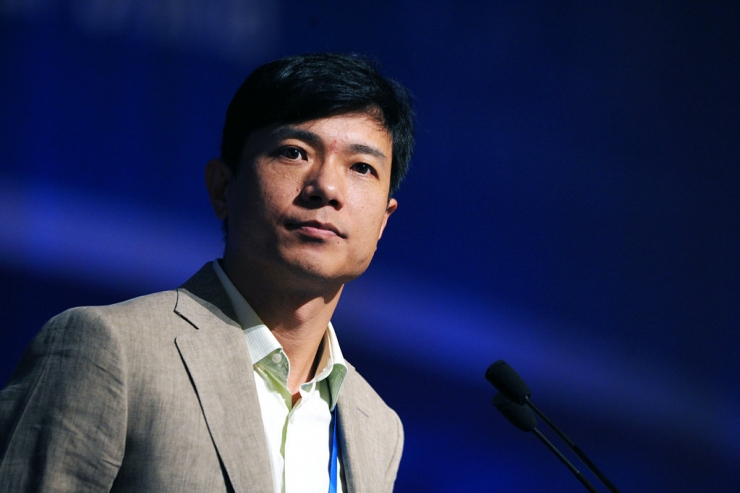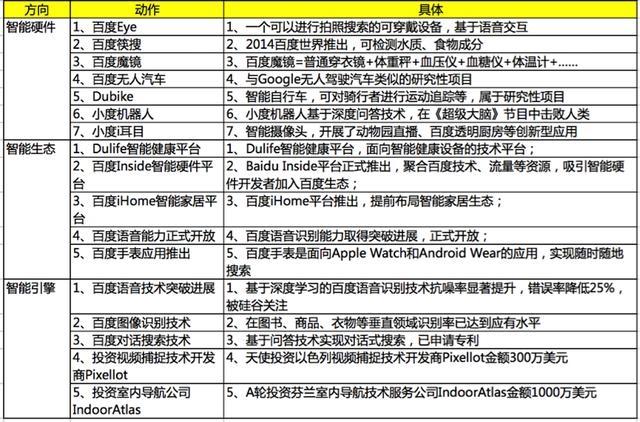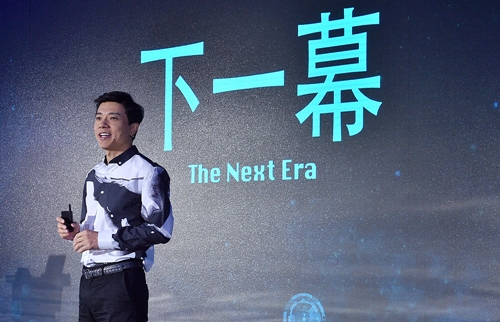
Today, Baidu convenes the 2016 Baidu World Conference, in which artificial intelligence is the highlight of this conference. Just as Li Yanhong said, “Artificial intelligence is the core of Baidu’s core.†Since Robin Li proposed to establish the Institute of Deep Learning in January 2013, Artificial intelligence gradually became the strategic direction of Baidu. Until now, it has been 44 months for Baidu to fully develop artificial intelligence. What kind of storms did Baidu experience in the past 44 months?
 2013: Chinese and American Research Centers Landed2013 was the year when Baidu artificial intelligence went from planning to landing. At that time, Baidu focused its energy on the formation of the AI ​​team. It set up an artificial intelligence research center in China and the United States.
In January 2013, the Baidu Deep Learning Institute was established
In January 2013, Robin Li proposed that Baidu will establish a research institute focused on Deep Learning and named the Institute of Deep Learning (IDL). This is China's first mention of deep learning as a core technological innovation. the company. Li Yanhong personally assumed the post of director and Yu Kai served as an executive vice president. Li Yanhong's idea is to make IDL a top research institution such as AT&T-Bell labs and Xerox PARC.
In April 2013, Baidu established the Silicon Valley Artificial Intelligence Laboratory
Three months later, Baidu set up an artificial intelligence laboratory in Cupertino, California. The laboratory was named "Deep Learning Research Center." Yu Kai personally flew to Cupertino and hired the first researcher. Yu Kai said: "If you want to compete with Google, you must consciously settle in Google's backyard." At that time, AI master Yann LeCun believes that Baidu's idea of ​​establishing a deep learning research center is a bit bold. The Silicon Valley Deep Learning Research Center did not make any significant moves in 2013. Therefore, it was only nominally established. Baidu was waiting for all personnel to gather in Silicon Valley Deep Learning and Research Center.
 2014: will be complete and boldly test the waterIn 2014, Baidu took a bold test of artificial intelligence. It not only vigorously studied the underlying technology, but also launched several consumer-grade products.
Baidu has mainly three dimensions of input in this year:
Consumer-level products: BaiduEye, Baidu Magic Mirror, Baidu Driverless Vehicle, Baidu Vision, Xiaodu Robot, DuBike, Baidu Chopsticks and other products.
Basic technical level: In-depth research on basic technology such as speech recognition, image recognition, deep learning, and motion capture.
At the ecological level, we have gradually opened up artificial intelligence-related technologies such as voice and images to attract third-party software and hardware developers to build a AI ecosystem. At the same time, it actively deployed overseas smart hardware platforms.

In January 2014, IDL launched the “Marshal Planâ€
In order to attract more young technical geniuses, Baidu launched the "Marshal Plan." This program is mainly aimed at the selection and cultivation of talents with excellent artificial intelligence technology below the age of 30. The first batch of "Marshals Plan" has 9 places, and those selected for the "Marshal's Plan" can directly get the ranks of Baidu T9 to T10, starting with an annual salary of RMB 1 million and not capping. In addition, if they pass the three-year assessment, the Marshals will have the opportunity to obtain “Baidu Angels Investment†and will fully lead a team of 20-30 people to independently lead innovative projects.
In May 2014, Wu Enda joined the team and Baidu Silicon Valley Artificial Intelligence Laboratory was formally established.
In April 2013, Baidu established an artificial intelligence laboratory in Silicon Valley. However, due to the lack of a leader, the lab has been in a state of stagnation for a long time. Thirteen months later, Baidu introduced Andrew Ng, the world’s top artificial intelligence expert, as Baidu’s chief scientist and led Baidu’s research institute. (Baidu Research Institute includes three major laboratories: Silicon Valley Artificial Intelligence Laboratory, Beijing Deep Learning Lab (formerly Deep Learning Institute), and Beijing Big Data Lab.) Also announced that the Silicon Valley Artificial Intelligence Laboratory was formally established.
In September 2014, involved in automatic driving, released big data platform
No one in Google debuted in 2012 and shocked the technology community. Two years later, Baidu signed a cooperation agreement with BMW and began to deploy automated driving. Among them, Baidu's three-dimensional map and related data services are integrated into BMW's vehicle navigation system to provide technical support for self-driving cars. At the same time, Baidu released a smart business platform that integrates Big Data and Baidu Map LBS to provide big data solutions for various industries.
In December 2014, Deep Speech was released
At the end of 2014, Baidu developed a breakthrough product: Deep Speech, which exceeds the accuracy of speech recognition in specific environments over Apple and Google products. Deep Speech performs better in noisy environments than similar technologies such as cars or people. Deep Speech achieves approximately 81% recognition accuracy in noisy environments such as restaurants. The highest recognition rate of other commercial speech recognition APIs, including Bing, Google, and Wit.AI, is only 65%.
In 2015, Baidu’s artificial intelligence suffered from external doubts. On the one hand, the core members of the IDL have left the tide: From 2015 to the present, IDL has lost more than one general, including the founder, executive vice president Yu Kai, Baidu IDL outstanding scientist Wu Ren (dismissed due to cheating), Bai Chang IDL chief architect Huang Chang, IDL director R & D architect Gu Jiawei and Bai Kai driverless car team formerly responsible person Ni Kai and others. On the other hand, a series of consumer-level AI products launched by Baidu in 2014 were not successful in the market. There was no shortage of Baidu artificial intelligence in the media industry.
Therefore, in 2015, Baidu cut some of its product lines, slowed the pace of new product launches, and focused its efforts on key breakthroughs in several core areas.
In September 2015, Baidu launched a robotic assistant "degree secret"
In 2015, robotics assistants reappeared in the eyes of the public. Especially after Magic's YC Demo Day fire, dialogue front-end interactions and artificial intelligence + artificial back-end information processing enabled virtual assistants to enter the 2.0 era, and Facebook opened the robots with the trend. Assistant M project plan. Baidu is naturally not far behind, and at the 2015 World Congress, robotics assistants, who provide secretarial search services for users, have been gradually enriched in their functions.
December 2015, Deep Speech 2 launch
After the success of Deep Speech, a year later, Baidu introduced a new generation of deep speech recognition system, Deep Speech 2, with a recognition accuracy of 97%. Deep Speech 2 is characterized by the ability to accurately recognize English by using a single learning algorithm and The Chinese language ability was selected by MIT Technology Review as one of the “Top Ten Breakthrough Technologies in 2016â€.
In December 2015, the Autonomous Driving Vehicle Division was established; the completion of the hybrid road test
After more than a dozen months of research and development, Baidu's driverless vehicles have achieved full-automatic driving for the first time in the mixed road conditions in cities, loops and highways. Baidu’s driverless car departs from Baidu Building in Xi’erqi, Beijing, and enters the G7 Jingxin Expressway. It passes through the Fifth Ring Road and arrives at the Olympic Forest Park. It then returns on the original route. Throughout the entire process, many complicated driving actions such as vehicle deceleration, lane changing, upper and lower ramps, overtaking, and turning over were implemented. The maximum speed of the test was 100 km/h.
Following the successful completion of the unmanned hybrid road test at the beginning of the month, Baidu announced the official establishment of the Autopilot Business Unit. Wang Jin, senior vice president of Baidu, served as general manager of the business unit, and Lin Yuanqing, director of the Baidu Deep Learning Lab, served as deputy general manager.
 2016: Opponents surface, Baidu absorbs foreign technology2016 is the first year of artificial intelligence. Major domestic companies have invested enough resources in the field of artificial intelligence, and related products have begun to emerge. Baidu's advantages accumulated in three years began to gradually decrease. In contrast, overseas, Apple, Google, and Facebook have all increased their depth of technology and breadth of application in the field of artificial intelligence by acquiring a large number of AI startup companies. Therefore, Baidu also tried to invest in M&A routes to increase its competitiveness.
July 18, 2016, Baidu announced investment in financial technology company Zest Finance
ZestFinance is a financial technology company that combines machine learning with big data analytics to provide customers with accurate credit scores. The company applies big data analytics to credit scoring services to help lenders more accurately assess loan targets. According to industry sources, Baidu will use ZestFinance's technology to judge users' credits. ZestFinance is characterized by the ability to analyze and process complex and unrelated data to make accurate credit decisions.
August 15, 2016, Baidu invests in laser radar company Velodyne LiDAR
Baidu's investment in Velodyne LiDAR aims to serve its own self-driving cars on the one hand, and to gain certain control over the supply of laser radars on the other. Previously, during the cooperation with Baidu, the supply price of the Velodyne 64-line laser radar has been reduced from 700,000 to 500,000 RMB. After the Baidu investment, the Velodyne LiDAR sensor will be mass-produced. According to statistics, if orders reach one million, 64-line laser radar can be reduced to five hundred dollars.
 Li Yanhong's AI Feelings 
44 months ago, Robin Li first demonstrated Baidu’s determination in the field of artificial intelligence. Today, 44 months later, Li Yanhong announced that he wants to position Baidu as an artificial intelligence company. In the current Baidu World Conference, Robin Li said, “ The growth of the Internet has encountered a bottleneck. The wild and brutal growth in the past has disappeared. The next scene of the Internet is artificial intelligence. â€
In the past 44 months, Baidu has opened the first scene of the Internet era. In the next scene, is Baidu ready?
The LED Indicator is a device that monitors the operation or position of an electrical device with light. The indicator light is usually used to reflect the working state of the circuit (with or without electricity), the operating state (running, outage or test) of the electrical equipment, and the position status (closed or disconnected).
In our company,mainly have eight series(as follow):
AD22-22DS LED Indicator
AD22-4SMD LED IndicatorAD16 LED Indicator
AD22-22MSD Buzzer
AD22-30DS LED Indicator
AD22-DAV Current Voltage Indicator
AD22-DAM Current Indicator
AD22-DVM Voltage Indicator
LED Indicators,LED Indicator Light,LED Indicator Lamp,LED Indicator Bulbs
Ningbo Bond Industrial Electric Co., Ltd. , https://www.bondelectro.com
![<?echo $_SERVER['SERVER_NAME'];?>](/template/twentyseventeen/skin/images/header.jpg)